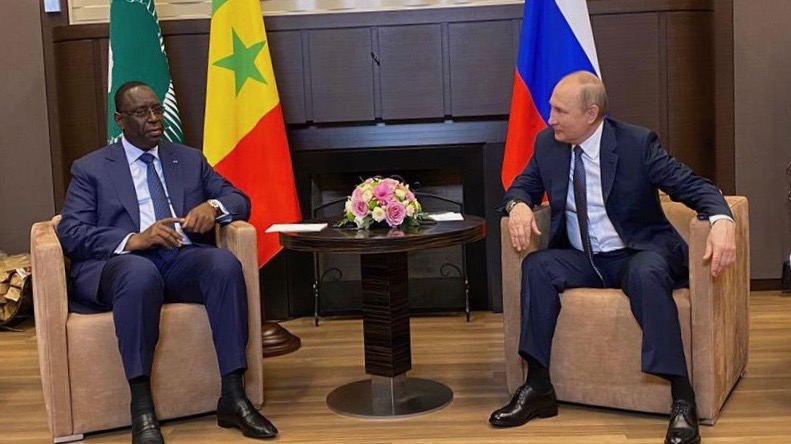US-led sanctions on Russia in the wake of its “special military operation” in Ukraine have caused severe food shortages in Africa, noted the leadership of the African Union (AU) in a meeting with Russian President Vladimir Putin on June 3 in the Russian city of Sochi along the Black Sea.
A week before the military operation was launched by Russia on February 24, with the stated aim of “demilitarization and denazification” of Ukraine, global prices of wheat, which is a staple for 2.5 billion people across the world, had already soared by 55%.
This was in no small part in anticipation of the conflict between the two countries which together produce around 30% of the world’s wheat and barley, one fifth of its maize, and over half of its sunflower oil, according to the United Nations Conference on Trade and Development (UNCTAD).
“Anti-Russia sanctions have made this situation worse and now we do not have access to grain from Russia, especially wheat,” said Macky Sall, AU chairperson and President of Senegal. Wheat imports made up 90% of the USD 4 billion worth of imports from Russia by African countries, according to the Agricultural Business Chamber of South Africa.
Somalia, which relies on the two countries for 90% of its wheat imports, is among the worst affected. The Democratic Republic Congo (DRC), the second largest African country, imports 80% of its wheat from Russia and Ukraine.
The third-largest country on the continent, Sudan, the most-populous country, Nigeria, and the most populated land-locked country, Ethiopia, rely on Russia and Ukraine for about 45% of their collective wheat imports. Landlocked Chad declared a “food emergency” a day ahead of the meeting.
While countries like Kenya manage to produce 100,000 metric tons of wheat domestically, this falls way short of the 2.4 million tons needed per year. “Kenya imports 60% of the deficit mainly from Ukraine and Russia. The current situation in the two countries has disrupted the importation supply chain,” according to a Kenyan millers association. Almost half of the 54 African countries depend on Russia and Ukraine for wheat imports, as per the FAO.
Domestic production within Africa is also affected because “we do not have access to fertilizer. The situation was bad and now it has become worse, creating a threat to food security in Africa,” Sall said.
The AU Commission’s chairperson, Moussa Faki Mahamat, appealed for “the suspension of sanctions against cereals and other key commodities, the need for their safe sea passage to mitigate the devastating economic and socioeconomic effects of a growing food and energy crisis which is further hampering the global recovery from the COVID-19 pandemic.”
An estimated 20 millions tons of export-bound wheat is stuck at Ukraine’s ports. While Ukraine and its US-led Western backers have accused Russia of causing the scarcity by hampering exports from Ukraine’s Black Sea ports, it is evident from the statements made by the AU leadership that this claim enjoys little credibility among African countries.
Putin’s spokesperson Dmitry Peskov told reporters ahead of the meeting that the Russian President “will tell our African friends the real state of affairs, he will explain once again what is happening there, who has mined the ports, what is needed for grain to go, that no-one on the Russian side is blocking these ports.”
In an interview with Rossiya 24 on the same day, Putin said that it was Ukraine which had mined the Black Sea ports and was hampering the movement of goods. He also gave the assurance that Russia would ensure a safe passage for wheat exports through the Azov Sea ports in Mariupol and Berdyansk which are under its control.
Russia was “always on Africa’s side,” Putin said in his press briefing ahead of the meeting, adding that “At the new stage of development, we place great importance on our relations with African countries, and I must say this has had a certain positive result.”
Sall had told Putin before the meeting that “our countries, even if they are far from the theater (of war), are victims on an economic level.” In his comments to the media after the three-hour-long meeting, Sall said he was leaving Russia “very reassured” from his interaction with Putin. “I found Vladimir Putin committed and aware that the crisis and sanctions create serious problems for weak economies, such as African economies,” he said.
Earlier, Ukrainian President Zelensky had requested the AU twice for an opportunity to address its assembly in Equatorial Guinea last month, where he wished to make his case on why Africa should also condemn Russia. However, African countries, despite being critical of the war, have refused to take sides or condone the sanctions on Russia, and have called for a negotiated end to the conflict.
At a meeting of the The Bureau of The Assembly of The African Union (AU) Heads of State and Government on May 10, it was agreed that the AU leaders could pay a visit to both Russia and Ukraine. The AU will reportedly also receive a video address from Zelensky. However, the date for this is yet to be scheduled.





